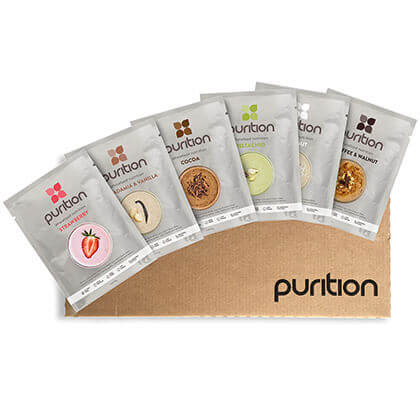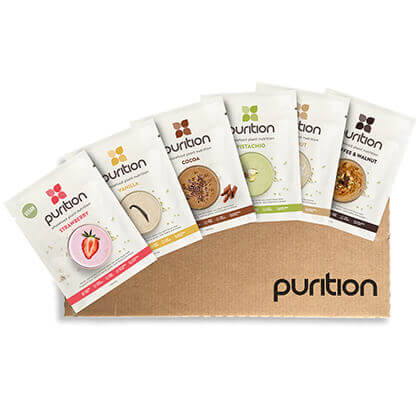Beginner’s guide to protein powder

With benefits like muscle gain, fat loss and appetite control falling firmly under protein’s long list of health benefits, protein powder has hit the market in a big way in recent years.
Bodybuilders and athletes seem to chug them down like water, so you may be wondering whether you need to add one to your gym routine too. But it’s not as simple as grabbing the first protein powder you find on the supplement aisle. From whey to hemp—and isolate to concentrate—protein powders aren’t created equally.
Whether you’re looking to build muscle, aid post-workout recovery or lose weight, here’s your complete beginner’s guide to protein shakes – what ingredients to look for, what all the jargon means and whether they’re actually necessary…
The scoop on protein powder
First things first, let’s cover the basics. Protein is one of three essential macronutrients – alongside fat and carbohydrates – that your body needs to function.
Protein is everywhere; in your hair, nails, skin, muscles, bones and pretty much every single tissue in your body. It’s a vital nutrient and is responsible for building and repairing tissues, cells and organs. It also carries vitamins, minerals and oxygen through your body and into cells and tissues that need them.
Simply put, it’s really important stuff. Whether you tend to hit the gym or not, you need to make sure you’re getting enough of it to feel and function your best.
You can find out more about the benefits and uses of protein in our high-protein diet guide.
What is a protein powder?
Protein powders are, essentially, a condensed and powdered form of protein. They can be made from either animal or plant sources and vary widely in terms of their ingredients and quality. Protein shakes are typically blended with milk or water to make a thick, creamy, milkshake-like drink.
Most people use a protein shake for the sake of speed and convenience. Mixing up a protein drink is a quick and easy way to add a marked boost to your daily protein intake, without having to spend extra time slaving over the stove.

Do I need a protein powder?
Okay, so we know that protein is essential for good health – but does that mean you need to start downing protein shakes by the gallon? Probably not.
If you eat a balanced diet with plenty of quality protein sources– think meat, eggs and fish (or tofu, legumes, lentils and nuts if you’re vegan) – you’re probably getting enough protein already. Plus, getting your protein from a plate of food brings the added benefit of other essential nutrients, like fibre, vitamins and minerals.
But don’t get us wrong, protein powders do have their place. If you’re an athlete or lead a particularly active lifestyle, want to gain lean muscle or struggle to meet your protein quota due to a busy lifestyle, a protein powder can be useful.
How much protein do I actually need?
The Reference Nutrient Intake (RNI) for protein in the UK is set as 0.75g of protein per kg of body weight, according to the British Nutrition Foundation. This amounts to around…
- 51kg/8 stone → 38g protein
- 57kg/9 stone → 43g protein
- 63.5kg/10 stone → 48g protein
- 70kg/11 stone → 53g protein
- 76kg/12 stone → 57g protein
- 82.5kg/13 stone → 62g protein

However, if you’re looking to build muscle or lose weight, consuming higher amounts of protein can help you to achieve your goals. The British Nutrition Foundation suggests an intake of 1.2-2g of protein per kg of bodyweight, per day, when eating for sport or exercise.
Wondering whether you’re reaching your quota? Spend a week or so tracking your nutrition via an app. Work out what your daily average protein intake is and see how you’re stacking up. You’ll then have a better idea of whether topping up your protein intake will be worthwhile.
Is it better to get protein from food?
It’s always preferable to gain your protein from whole foods, rather than processed shakes or bars. Getting your protein from real food means you’ll also consume plenty of fibre, healthy fats and micronutrients, which will help to keep your body in tip top condition.
In comparison, most protein powders contain large amounts of gums, flavourings, sweeteners and synthetic vitamins and minerals. While they may deliver a hefty serving of protein, they won’t do much good for your long-term health. Recovering from sport and intense exercise or losing weight is not just about protein – it’s about your diet as a whole.
So, for those who want a convenient protein boost, from a healthy real food source, is there a solution? Yes. Just choose a protein powder made with real food ingredients and avoid synthetic, fake shakes – they’ll do your body more harm than good. It’s all about having your eye on the ingredients. If the list looks more like a chemistry lesson than real food, it’s definitely best avoided.

If you’re struggling to get enough protein into your day-to-day diet, check out our tips on how get more protein.
Types of protein powder
So you’ve decided you want to buy a protein powder, but one quick browse of the supplement aisle leaves you feeling like a lost puppy. Isolate what, casein who… and what on earth does ‘complete’ protein mean?
Don’t worry, we’ve got you covered! Here’s your quick guide to the different types of protein powder:
Concentrate vs isolate
During processing, proteins are produced into a concentrate or isolate in order to increase their protein content:
- Protein isolates undergo additional purification to minimise carbohydrates and fats and enhance their protein content. They typically contain 90% or more protein by weight. Due to the extra filtering involved, protein isolates contain little to no lactose.
- Protein concentrates are the least pure (and therefore cheapest) type of protein. They typically contain between 25% and 80% of protein by weight.
Concentrate vs isolate
Protein is made up of 20 small molecules called amino acids. Your body needs each of these 20 amino acids to produce proteins effectively.
9 of these amino acids are considered essential – your body cannot make them, so you must include them in your diet. Nonessential amino acids can be made by your body, so consuming them through food isn’t quite so important.
Unlike whey protein, not at all vegan protein powders are considered a ‘complete’ source of protein. That’s because they don’t contain enough of each of the 9 essential amino acids your body needs.
- Complete protein powders contain all 9 essential amino acids.
- Incomplete protein powders lack 1 or more of the 9 essential amino acids.
But do you need to worry about it? Probably not. Studies have repeatedly shown that even a diet based purely on plant foods that meets energy (calorie) requirements will meet all essential amino acid needs.
But if you’d still prefer to choose a ‘complete’ vegan protein, try Purition Vegan. Our natural alternative to vegan protein powder is made from nuts and seeds, with all 9 essential amino acids. All of our 14+ vegan flavours are high in protein, fibre and healthy fats and make for a quick and easy high-protein vegan breakfast.
Whey vs casein vs plant proteins
Protein can be derived from either animal or plant-based sources, meaning there’s a protein powder to suit just about everyone. The three types of protein powders you’ll come typically come across are:
- Whey protein is a complete protein derived from milk and is a direct by-product of the cheese-making process. Whey is a fast-releasing protein; i.e. it can be used almost immediately by the muscles for restoration and growth.
- Casein protein is also a complete protein derived from milk and is a by-product of the cheese-making process. However, it’s known as a slow-releasing protein as it takes longer to digest and metabolize than whey.
- Plant proteins such as soy, hemp, pea, rice and pumpkin are derived directly from plant sources. Most single plant proteins are incomplete but can be combined with other plant proteins to create a complete blend. Plant proteins are typically a lot easier for the body to digest than dairy protein products.
How to use protein powder
In their simplest form, protein powders can be blended with milk or water to create a quick and easy protein shake with minimal prep time. You can also add some extras like ice, fruit and veggies for an added micronutrient boost.
However, one of the best things about investing in a good quality protein powder is the sheer versatility you’ll gain from the product. Protein powders can also be blended into smoothies, added to breakfast oats, incorporated into healthy cakes and bakes, blended into protein balls or added to pancakes — amongst many, many other creative ideas!
Top tip: If your goal is weight loss, be mindful of the added extras you add to your protein shake — the calories and carbs can quickly add up. We recommend adding a handful of berries or ⅓ of a banana, plus some ice, to Purition.

When should I take protein powder?
Should you take your protein shake before or after a workout? It's an ever-debated topic!
Thankfully, it’s actually a lot easier than it seems. Recent evidence does not support the claim that immediate consumption of protein pre- and/or post-workout significantly enhances strength and instead, shows that ‘consuming adequate protein in combination with resistance exercise is the key factor’.
In simple terms, when you consume your protein isn’t all that important. You just need to make sure you’re getting enough of it, throughout the day – no matter how close to your workout that happens to be.
Is Purition a protein powder?
Purition isn’t a protein powder… it’s better than a protein powder.
Most protein shakes are made of milk protein/powders and/or vegan protein powders from undisclosed origins, synthetic colourings and flavourings, artificial sweeteners, gums and emulsifiers.
Purition is different. It’s got all the convenience of a protein shake but is made in the UK from locally-sourced whole foods – rather than ultra-processed and highly refined powders that have been shipped across the globe.
Your body can only use around 20g of protein per meal, which is why Purition contains 16–20g protein per serving (you’ll gain additional protein from the milk or yoghurt used to prepare it). It provides all essential and non-essential amino acids as a quick and convenient wholefood fuel, alongside nourishing healthy fats and fibre. The results? Improved diet quality and better health and fitness results!
Hopefully, our complete guide to protein powder has given you ‘the scoop’ on all things protein. But if you’re still feeling overwhelmed or aren’t sure if a protein powder is for you, get in touch. Email us on hello@purition.co.uk with your queries and questions — we’d be happy to help!
Read more...
Does fat make you fat?
The importance of healthy fats
High-protein diet:
Benefits, risks & how to do it
Protein & Purition:
What you need to know
What you should do next...
1. Subscribe to our newsletter
Subscribe to our newsletter for the latest news, recipes and advice about healthy eating.
2. Try Purition for 14 days
Unlock all the benefits of a whole foods diet with none of the effort. Get 2 weeks of easy nutritious meals & pick your own flavours!


